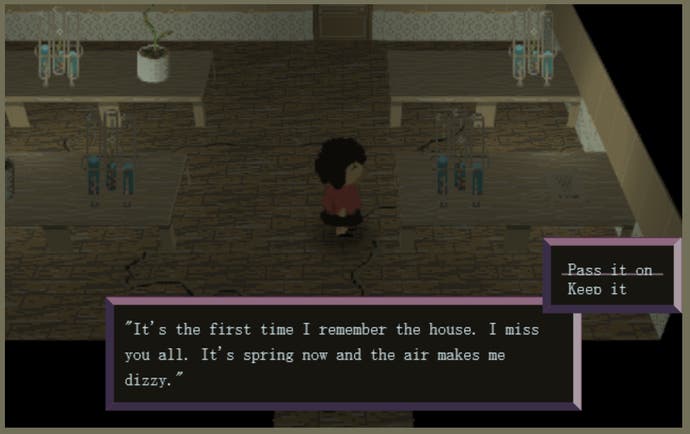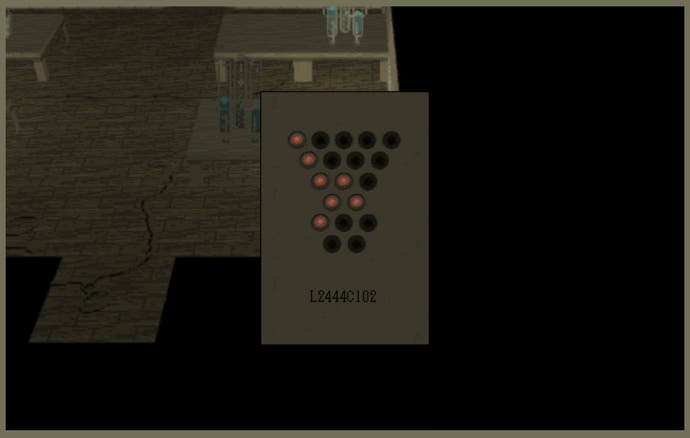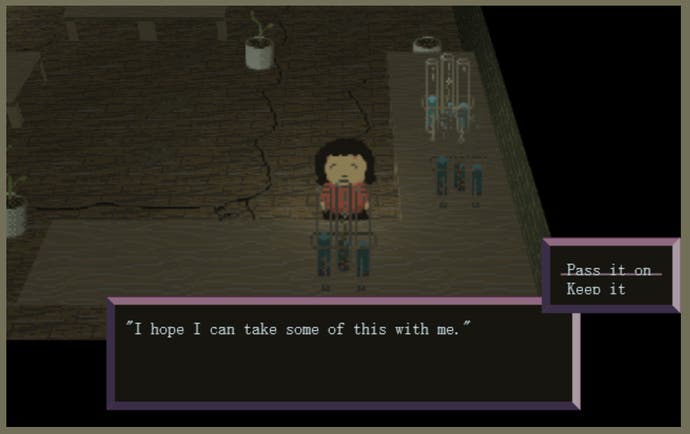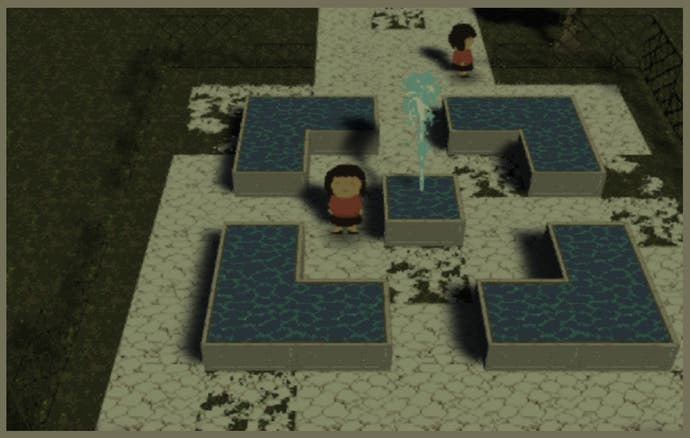Behind The Red Dais is a brief, vivid enigma about listening to the soil
Earthenware.
Behind The Red Dais begins with an appeal to the nose. "First, the smell of rotten strawberries..." reads the opening text. "That's how you will know you are not dreaming." It's both an evocative line and a distancing, even self-defeating one: despite the fervent efforts of certain peripheral makers, video games continue to be devoid of an olfactory component. And yet, the smell lingers. There's a crimson flash, as though you'd taken damage, and the screen fades up to reveal a sleepy but cheerful-seeming woman standing by a bed. On the bed, a "red, dry stain".
Playable for free in a browser, Behind The Red Dais is a game from Domino Club, a group of anonymous gamejammers who have devised some of the most wonderful, fearful and specific pieces of digital art I've ever stumbled on. It's a short, potent work of curiosity and suspense, visually reminiscent of both Silent Hill and Animal Crossing, which dangles the unconventional promise of "zero endings".

Moving with the arrow keys, you leave the bedroom and explore a series of shadowy backrooms, each with the same dingy floral skirting boards and beige panelling. Roots wind across a scuffed wooden floor, leading you between chambers or disappearing beneath bookcases. The soundtrack is a blend of slow electronic guitar chords and dialtones that manages to feel at once sad, droll and empty. There are a handful of other people in this labyrinth, but they only make dismissive fart noises when you approach them. Instead, you'll receive eerie messages from the soil in glass test tubes, dispersed on tables throughout the complex.
Some of these messages are melancholy notes-to-self: "sleep feels good in this world"; "nothing will ever be sadder than this moment". Others appear to have an external object of address: "I know now that you are all my siblings. The music continues..." You're given the choice of "keeping" these messages, which allows them to be read again, or "passing them on", which causes the screen to flash and the test tube sample to become non-interactive. While there are a couple of doors which remain shut till you've visited every last room, the choice of whether to keep the messages or pass them on seems to have no practical in-game consequence.
It's possible that what you're doing by keeping phrases is reconstructing a backstory, as in many other games that feature found documents. Perhaps even, an autobiography. The opening scene could be about somebody's first experience of menstruation, and there's a diary entry about an alienated child. There could be an overarching, mechanical puzzle to solve, too: in certain rooms, you stumble on dot diagrams with number-letter sequences. You'll also find plant pots in stages of growth and decline: bare earth, a single twig, leaves, blossoms and spilled soil. I wonder if there's another kind of sequence hidden there, waiting to be dug up.


But I'm reluctant to join the dots too avidly, even as those roots lure me irresistibly between rooms and worktables. I think the game's power stems not from acts of final recombination, but discovering how retaining certain words or allowing them to "pass on" alters their mood and that of the space around them - an agenda that, of course, depends on replaying the game, rather than completing it.
One of the more enigmatic lines is: "My feet are dancing. I hear this voice fade." What conclusions am I drawing when I choose to leave that observation as I found it? Am I suggesting that it belongs in this drained yet arresting world? If I "pass it on", am I washing my hands of the sentiments expressed, or attempting to share them? How does keeping it or relinquishing it affect my reading of neighbouring phrases? And why can I still smell strawberries?









